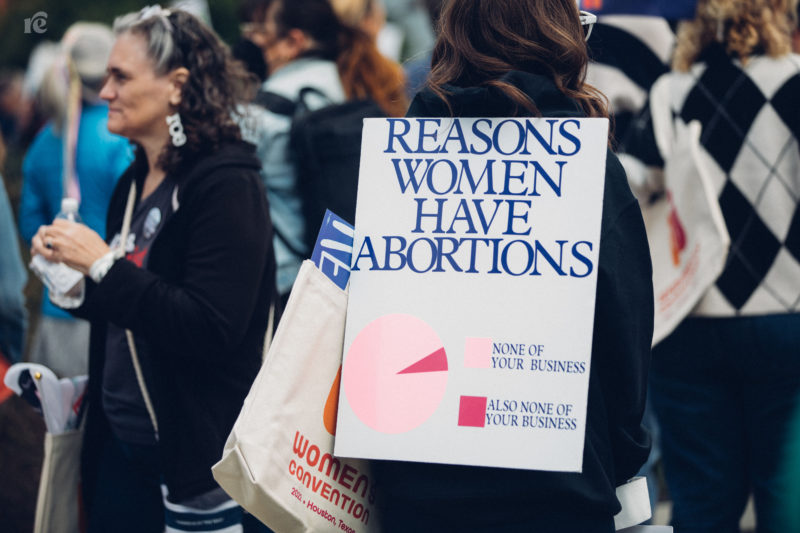‘A General State of Confusion’: How Abortion Misinformation Misleads Patients
From crisis pregnancy centers to gray legal areas to internet algorithm censorship, abortion misinformation is running rampant.

As the legal status of abortion in some states changes from one day to the next, people who need abortions are scared, confused, and hungry for information. This is particularly true among communities that face the greatest barriers to abortion access, including young people and people of color.
Unfortunately, abortion-related misinformation—whether intentionally misleading or not—abounds both in online spaces and via word of mouth. Inaccurate and misleading sources can be difficult to distinguish from trusted, vetted ones, and advocates worry that the prevalence of misinformation could delay or deter people seeking an abortion.
The stakes couldn’t be higher: As more and more states ban abortion, pregnant people’s appointments are already being delayed, forcing them to pay for more expensive procedures. Any further delay, or a scam that results in financial loss, could be the difference between someone getting their wanted abortion and being forced to remain pregnant.
“In broad strokes, the most common pieces of confusion and misinformation we see have to do with the legal gray area we’re in,” Lynn McCann, the Baltimore Abortion Fund’s co-director, said. “We’ve been hearing a lot from callers who live in a state where abortion is still legal, but they think it’s banned. It’s hard for us to tell where people are getting that message. Is it deliberate, or is it because of a general state of confusion?”
In all likelihood, it’s a mix of both. When talking about abortion-related misinformation, the same actors usually rise to the top of the list: crisis pregnancy centers, or CPCs. These anti-abortion fake clinics have long been known to lure in abortion seekers, often by posing as real clinics. They share false and stigmatizing information about abortion with the goal of delaying care or preventing them from having abortions altogether. Even when Roe v. Wade was the law, CPCs outnumbered legitimate abortion clinics by more than 3-to-1 and had a 5-to-1 funding advantage. CPCs are now expanding—and they’re taking advantage of this moment of confusion and panic.
Amanda Carlson, abortion fund director and senior policy associate at Cobalt Advocates in Colorado, said she is aware of at least one instance in which a patient traveled to Colorado thinking they had an appointment for an abortion at what was a CPC.
Fortunately, they got in touch with a Colorado abortion fund that helped them secure an appointment at a real clinic, “but the fact that the CPC let them travel here?” Carlson said. “That was disturbing to me.”

Elisa Wells, co-founder and co-director of Plan C, which provides information about self-managed abortion, said CPCs have also begun to imitate Plan C’s branding—a tactic they have long used with brick-and-mortar clinics.
“CPCs are very savvy,” Wells said. “When we see somebody co-opting our language or our branding, we try to put in a report, but of course, nothing ever happens.”
According to Wells, Plan C has been in communication with Google and other tech companies about how they present abortion-related information. After outcry over internet searches for abortion clinics often turning up results for CPCs, Google changed its policy in 2019 to require that businesses running ads targeted to abortion-related keywords would have to disclose whether they provided abortion services. However, CPCs were still showing up in Google searches for abortion clinics. Finally, in August, Google announced it would only show verified abortion providers in local search results for queries like “abortion clinic” or “abortion near me.” Yelp had also announced it would add disclaimers on CPC pages after recategorizing hundreds of businesses as crisis pregnancy centers last year.
But these are imperfect solutions: A disclaimer that an organization does not provide abortion services would also apply to Plan C and many other trusted sources of information, Wells noted. Instead, she said, search engines and social media platforms should designate websites like Plan C’s as reliable sources of information so that they don’t get suppressed—or outright censored—by algorithms.
Sometimes, it’s hard to tell whether an effort is well intended but poorly run or just an outright scam—leaving people who need abortions open to unnecessary risk. Carlson pointed to one example in particular of an abortion funding website set up by a New Mexico group asking abortion seekers to provide a Social Security number and other personal information.
“Maybe it was well intended, but they weren’t willing to listen to folks in the movement when we tried to tell them that was problematic,” Carlson said. “People should not be providing individuals that are not HIPAA-compliant entities with personal information.”
Even more alarming is Abort Offshore, an organization claiming to offer abortions up to 20 weeks on a boat in the Gulf of Mexico, requiring payment upfront and gathering patient information through a form that doesn’t appear to be secured in any way.
Plan C orders pills from all the online pharmacies it lists to ensure that they are the real deal, and lets pharmacies know they will be removed from the listings if Plan C receives repeated user complaints about them. According to Wells, they have yet to encounter an actual scam. In the international market, where ordering abortion pills online has been a widespread practice for longer than it has in the United States, scams do pop up, said Kinga Jelinska, co-founder and executive director of Women Help Women. When Women Help Women or its partner organizations uncover a scam, they publicize it so people know not to buy pills from that provider. When they encounter price gouging, they put pressure on the seller to lower their prices.
Jelinska suggests that these practices can be replicated in the United States, but acknowledges they are “a bit exhausting.” As for how to counter misinformation and unreliable sources, “the answer is to create as many reliable sources as possible and widely publicize them,” she said. Instead of leaving nonprofit and volunteer groups to pick up all the slack, state governments could step in and help. Carlson points to the recent public awareness campaign in New York, with ads linking to a website featuring established directories like Abortion Finder and I Need an A, as a great example of how states should be communicating information about abortion through a public health lens.
Finally, said Carlson, well-meaning but ill-informed groups have been another major source of misinformation.
“We saw this happen with [Texas] SB 8, or even back in 2019 when there was a flurry of abortion bans—people setting up groups calling them ‘auntie networks’ or ‘underground railroads,’ which is messaging we’re really trying to educate and steer people away from,” she said. “We’re trying to explain to people that they shouldn’t be encouraging individuals they don’t know to come stay with them, because there are serious safety concerns there. The intention is not bad, but you shouldn’t be asking a stranger to stay with you, and a stranger shouldn’t have to stay with you.”
McCann said instead of diverting time, energy, and resources away from already-established networks, “support abortion funds and listen to organizations that have a track record.”
“Don’t try to reinvent the wheel.”
